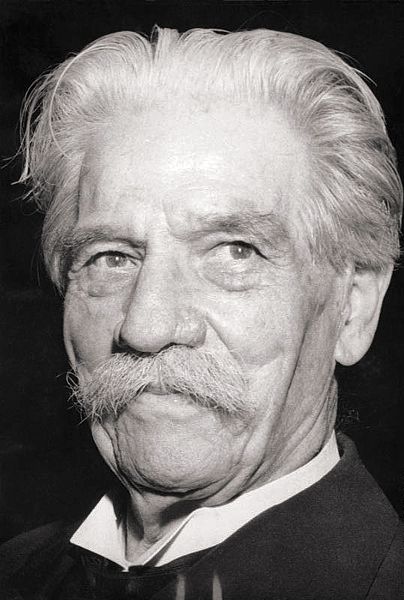Difference between revisions of "Albert Schweitzer (1875-1965), scholar"
| Line 1: | Line 1: | ||
[ | [[File:Albert Schweitzer.jpg|Albert Schweitzer]] | ||
'''Albert Schweitzer'' (1875-1965) was a German Alsatian scholar, theologian, musician, philosopher and physician. Born January 14, 1875 in Kayserberg, Alsace-Lorraine, then a German province. A world-class organist who specialized in the music of Bach, Schweitzer gave concerts throughout Europe. Studied philosophy and theology at Tübingen, receiving his doctorate in 1899. His dissertation at the Protestant theological faculty at Strasburg, ''Geschichte der Leben-Jesu-Forschung'' (republished in 1910 as the more familiar ''Quest of the Historical Jesus''), is a landmark text in historical Jesus studies. Although this text sealed his reputation as a theologian, Schweitzer relinquished an academic career in theology to study medicine (1905-1912). Though family and friends loudly protested the career change, Schweitzer moved to Lambarene in French Equatorial Africa (modern Gabon) where he established a jungle hospital. Schweitzer was devoted to humanity and world peace; he received the Nobel Peace Prize in 1952 for humanitarian efforts in Africa and for his philosophy of reverence for life. Died September 4, 1965 in Lambarene, Gabon. | |||
==Works == | |||
== | ====Books==== | ||
*[[Von Reimarus zu Wrede (1906 Schweitzer), book]] | *[[Von Reimarus zu Wrede (1906 Schweitzer), book]] | ||
**[[The Quest for the Historical Jesus (1910 Schweitzer), book (English ed.)]] | **[[The Quest for the Historical Jesus (1910 Schweitzer), book (English ed.)]] | ||
| Line 18: | Line 17: | ||
*[[Die Mystik des Apostels Paulus (1930 Schweitzer), book]] | *[[Die Mystik des Apostels Paulus (1930 Schweitzer), book]] | ||
**[[The Mysticism of Paul the Apostle (1931 Schweitzer), book (English ed.)]] | **[[The Mysticism of Paul the Apostle (1931 Schweitzer), book (English ed.)]] | ||
==Biography== | |||
*[http://en.wikipedia.org/wiki/Albert_Schweitzer Wikipedia] / [http://de.wikipedia.org/wiki/Albert_Schweitzer Wikipedia.de] | |||
==References== | ==References== | ||
| Line 24: | Line 27: | ||
*[[D.E. Nineham]], in [[Jesus in History, Thought, and Culture (2003 Houlten), edited volume]] | *[[D.E. Nineham]], in [[Jesus in History, Thought, and Culture (2003 Houlten), edited volume]] | ||
| Line 38: | Line 38: | ||
[[Category:Historical Jesus | [[Category:Historical Jesus Studies|Schweitzer]] | ||
[[Category:Historical Jesus | [[Category:Historical Jesus Studies--1900s|~1875 Schweitzer]] | ||
[[Category:Historical Jesus Studies--Germany|~1875 Schweitzer]] | |||
[[Category:Pauline | [[Category:Pauline Studies|Schweitzer]] | ||
[[Category:Pauline | [[Category:Pauline Studies--1910s|~1875 Schweitzer]] | ||
[[Category:Pauline Studies--1930s|~1875 Schweitzer]] | |||
[[Category:Pauline Studies--Germany|~1875 Schweitzer]] | |||
Revision as of 01:58, 28 July 2014
'Albert Schweitzer (1875-1965) was a German Alsatian scholar, theologian, musician, philosopher and physician. Born January 14, 1875 in Kayserberg, Alsace-Lorraine, then a German province. A world-class organist who specialized in the music of Bach, Schweitzer gave concerts throughout Europe. Studied philosophy and theology at Tübingen, receiving his doctorate in 1899. His dissertation at the Protestant theological faculty at Strasburg, Geschichte der Leben-Jesu-Forschung (republished in 1910 as the more familiar Quest of the Historical Jesus), is a landmark text in historical Jesus studies. Although this text sealed his reputation as a theologian, Schweitzer relinquished an academic career in theology to study medicine (1905-1912). Though family and friends loudly protested the career change, Schweitzer moved to Lambarene in French Equatorial Africa (modern Gabon) where he established a jungle hospital. Schweitzer was devoted to humanity and world peace; he received the Nobel Peace Prize in 1952 for humanitarian efforts in Africa and for his philosophy of reverence for life. Died September 4, 1965 in Lambarene, Gabon.
